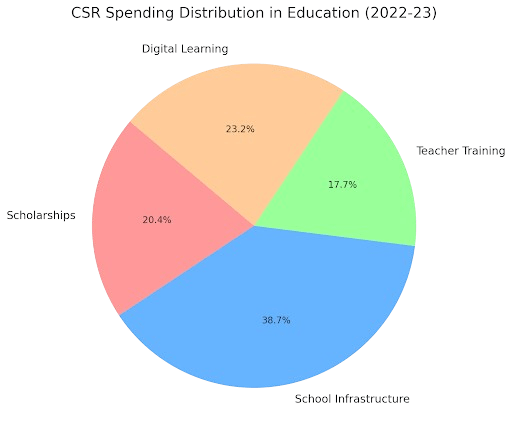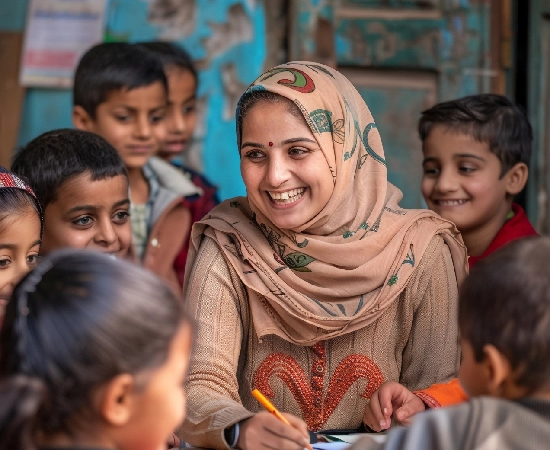The Growing Role Of CSR In Education
CSR initiatives in the education sector involve companies allocating resources to improve learning opportunities for underprivileged children, enhance school infrastructure, and introduce skill-based programs. The Indian government has played a crucial role in this transformation by making it mandatory for companies with a net profit above ₹5 crore to spend 2% of their average net profits on CSR activities, including education. This policy has encouraged businesses to take proactive steps toward educational development.
Companies such as Tata Group, Infosys Foundation, and HDFC Bank have led revolutionary initiatives to uplift education in India. From building schools and providing scholarships to supporting digital literacy and vocational training, these organizations are transform the educational landscape. Their efforts are particularly impactful in rural and underserved areas, where government resources are rarely insufficient.

Why CSR In Education Is A Game Changer

CSR initiatives in education do more than just provide access to learning. they empower individuals, create equal opportunities, and contribute to nation-building. When companies invest in education, they are not only fulfilling their corporate responsibility but also tailoring the workforce of tomorrow. By combining learning gaps, improving infrastructure, and introducing skill-based education, CSR is laying the foundation for a more educated and empowered India.
As corporate involvement in education continues to grow, the future looks promising for millions of students across India. With sustained efforts and strategic investments, CSR in education is indeed a game changer for the nation’s future generations.
State-Wise CSR Spending On Education (Fy 2014-15 To Fy 2022-23):
| Sr. No | State/UT | FY 2014-15 | FY 2015-16 | FY 2016-17 | FY 2017-18 | FY 2018-19 | FY 2019-20 | FY 2020-21 | FY 2021-22 | FY 2022-23 |
|---|---|---|---|---|---|---|---|---|---|---|
| 1 | Maharashtra | 724.59 | 1196.34 | 1483.91 | 1277.81 | 1839.73 | 1985.82 | 3464.81 | 5380.41 | 5497.32 |
| 2 | Karnataka | 277.1 | 344.4 | 379.7 | 546.5 | 798.4 | 1181.2 | 717.7 | 1033.8 | 1164.2 |
| 3 | Gujarat | 1461.6 | 1604.26 | 2008.42 | 550.86 | 683.95 | 701.07 | 1461.6 | 1604.26 | 2008.42 |
| 4 | Andhra Pradesh | 182.99 | 266.96 | 316.68 | 208.35 | 186.65 | 204.74 | 155.18 | 176.89 | 361.44 |
| 5 | Tamil Nadu | 1174.07 | 1432.06 | 1562.48 | 290.67 | 239.73 | 351.6 | 1174.07 | 1432.06 | 1562.48 |
| 6 | Uttar Pradesh | 907.32 | 1339.18 | 1152 | 375.51 | 427.68 | 656.42 | 907.32 | 1339.18 | 1152 |
| 7 | Assam | 79.37 | 116.84 | 86.69 | 103.67 | 81.85 | 130.21 | 97.17 | 147.79 | 126.89 |
| 8 | Arunachal Pradesh | 1.1 | 0.17 | 10.25 | 10.05 | 6.8 | 12.31 | 5.27 | 2.48 | 5.22 |
| 9 | Andaman and Nicobar | 0 | 0.33 | 0.05 | 0.08 | 0 | 0 | 0.05 | 4.78 | 0.95 |
Observations:
- Maharashtra has consistently received the highest CSR funds in education, with spending increasing from ₹724.59 crores in FY 2014-15 to ₹5,497.32 crores in FY 2022-23.
- Karnataka and Gujarat have also attracted substantial CSR investments, reflecting their status as major corporate hubs.
- States like Andhra Pradesh, Tamil Nadu, and Uttar Pradesh have seen fluctuating but generally increasing CSR contributions towards education over the years.
Corporate Social Responsibility In The Education Sector
Corporate Social Responsibility (CSR) has emerged as a transformative force in India’s education sector, bridging gaps in accessibility, infrastructure, and quality of learning. Education is a fundamental right, yet millions of children, particularly in rural and underprivileged communities, lack access to quality schooling. Recognizing this, corporations are increasingly investing in educational initiatives that run long-term social impact.
CSR initiatives cover a wide spectrum, including building schools, funding scholarships, training teachers, integrating technology into classrooms, and promoting skill-based learning. These efforts align with Sustainable Development Goal, which focuses on ensuring inclusive, equitable, and quality education for all.
Several corporate giants have made significant contributions to education in India. The Tata Group, for example, has established premier institutions like the Indian Institute of Science (IISc) and Tata Institute of Fundamental Research (TIFR). Additionally, programs such as “Masti Ki Pathshala”, which supports street children, and “Titan Kanya”, which empowers girls through education, reflect Tata’s commitment to inclusive learning.
Similarly, the Infosys Foundation has played a key role in improving education accessibility for marginalized communities. Their initiatives focus on STEM learning in rural areas, girl child education, and linking education with employability. The foundation also collaborates with various organizations to upskill women in technology and support midday meal schemes, ensuring better retention rates in schools.
CSR Spending On Education Initiatives (INR Crores)
| Sr. No | Year | Scholarships (INR Crores) | School Infrastructure (INR Crores) | Teacher Training (INR Crores) | Digital Learning (INR Crores) | Total CSR in Education (INR Crores) |
|---|---|---|---|---|---|---|
| 1 | 2016-17 | 1200 | 2300 | 950 | 750 | 5200 |
| 2 | 2017-18 | 1400 | 2500 | 1100 | 950 | 5950 |
| 3 | 2018-19 | 1600 | 2900 | 1200 | 1200 | 6900 |
| 4 | 2019-20 | 1750 | 3200 | 1350 | 1400 | 7700 |
| 5 | 2020-21 | 1500 | 2800 | 1250 | 1600 | 7150 |
| 6 | 2021-22 | 1600 | 3000 | 1400 | 1800 | 7800 |
| 7 | 2022-23 | 1850 | 3500 | 1600 | 2100 | 9050 |
Observations:
- School Infrastructure consistently receives the highest share of CSR funding, reflecting a strong corporate focus on building and improving school facilities.
- Digital Learning has seen a sharp increase in CSR allocations since 2019-20, driven by the pandemic and the need for online education.
- Scholarships have maintained steady growth, ensuring financial support for students from underprivileged backgrounds.
- Teacher Training programs have been receiving increased funding, recognizing the importance of improving the quality of education.

The Role Of CSR In Promoting Skill-Based Education
In today’s dynamic job market, skill-based education has become a necessity. Traditional academic institutes often fail to equip students with practical, industry-relevant skills, creating a gap between education and employment. To address this, CSR initiatives are increasingly promoting job-related training, technical education, and entrepreneurship programs.
Public Sector Undertakings (PSUs) and private corporations have been instrumental in funding professional training institutes, establishing skill development centers, and supporting apprenticeship programs. Between 2019 and 2022, PSUs alone invested approximately ₹717.14 crore in vocational training and livelihood enhancement projects, highlighting the growing emphasis on skill-based education.
One of the most notable corporate contributions to skill development comes from Larsen & Toubro (L&T). Through its Construction Skills Training Institutes (CSTIs), L&T provides hands-on training in machinery, bar bending, carpentry, electrical work, and plumbing, improving employment prospects for thousands of underprivileged youth. Additionally, L&T extends scholarships to engineering and technology students, promoting a skilled workforce.
Similarly, Infosys Foundation has launched multiple initiatives to promote STEM (Science, Technology, Engineering, and Mathematics) education in rural areas. Programs like “Unnati” focus on upskilling women in technology, while partnerships with NGOs enhance digital literacy among students.
Why Education Should Be A Top Priority For CSR Investments
- Low literacy rates in rural areas
- Gender disparities in education
- Lack of infrastructure and basic amenities in schools
- High dropout rates due to financial constraints
Given these challenges, CSR investments in education are not just an ethical obligation but also a strategic imperative for long-term social impact.

The Multifaceted Benefits Of CSR In Education
| Sr. No | Industry | Company/Organization | CSR Initiative | CSR Spending (Approx.) | Impact |
|---|---|---|---|---|---|
| 1 | IT | Birlasoft | e-Vidya (Digital & Financial Literacy) | ₹5.27 Crore (2020-21) | Literacy & Skill Development |
| 2 | Banking | Federal Bank | Scholarships for Professional Courses | Not Disclosed | Higher Education Support |
| 3 | Manufacturing | Mahindra Group | Project Nanhi Kali (Education for Girls) | ₹153 Crore (Cumulative) | 153,190 Girls Educated |
| 4 | Manufacturing | Aditya Birla Group | Running 42 Schools, Student Sponsorships | Not Disclosed | 18,000 Students Benefited |
| 5 | Telecom | Bharti Airtel Foundation | Satya Bharti School Program | Not Disclosed | 2.6 Million Students Reached |
| 6 | Conglomerate | Reliance Foundation | Dhirubhai Ambani Scholarship, School Support | Not Disclosed | 13 Schools, University Plans |
Companies Spend On Education. A Sector-Wise Breakdown
Bridging the Education Gap
Companies play a crucial role in making education accessible to underprivilegaed communities by funding schools, providing free learning materials, and offering financial aid to students.
Enhancing Employability
Skill-based CSR initiatives ensure that students graduate with relevant, job-ready skills, improving employment opportunities and reducing dependency on government support.
Strengthening the Economy
A well-educated workforce contributes to higher productivity, innovation, and entrepreneurship, which are essential for a country's economic progress.
Encouraging Digital Learning
With the rise of EdTech, companies are integrating technology into classrooms, providing free online courses, digital labs, and e-learning resources, ensuring that students in remote areas have access to quality education.
Promoting Gender Equality
Many CSR initiatives focus on girls’ education, breaking generalizations and empowering women to Get higher education and careers in STEM fields.
Addressing Health and Nutrition
Many students drop out due to multination and health issues. Corporations are tackling this by funding midday meal programs, building sanitation facilities, and promoting menstrual hygiene awareness in schools.
The Impact Of CSR Education Programs On Rural And Urban Schools
CSR in Rural Education
Rural schools often struggle with insufficient infrastructure, lack of trained teachers, and limited access to technology. To address these challenges, corporations are:
- Building schools and upgrading existing infrastructure to provide safe and well-equipped learning environments.
- Deploying mobile classrooms that bring digital learning to remote villages.
- Training teachers through CSR-funded workshops to improve teaching procedures.
- Providing free learning materials and scholarships to encourage students to continue their education.
For instance, Tata Trusts has been instrumental in enhancing rural education through its “Kalike” initiative, which focuses on teacher training, curriculum development, and digital education for underprivileged students.
CSR in Urban Education
Urban schools, while better equipped, face challenges such as high dropout rates, affordability issues, and a lack of industry-aligned skill development programs. CSR programs in urban areas often focus on:
- Providing scholarships and financial aid to economically disadvantaged students.
- Integrating technology into classrooms through smart boards, AI-based learning tools, and e-learning platforms.
- Establishing STEM labs and innovation hubs to encourage students to explore careers in science and technology.
- Linking education with employability through industry partnerships and internship opportunities.
A great example is HCL Foundation, which has launched urban education programs aimed at integrating coding, robotics, and AI education into school curriculums, preparing students for tech-driven careers.
Top 10 Companies Leading CSR Initiatives In Education In India
01.
Tata Group
The Tata Group is a leader in educational CSR, with projects such as the Tata Trusts focusing on scholarships, digital literacy, and school infrastructure improvement. Their Tata STRIVE program offers technical education to improve employability.
02.
Infosys Foundation
The Infosys Foundation wants to improve education by offering grants to schools, paying teacher training, and promoting digital learning activities. The Aarohan Social Innovation Awards celebrate educational initiatives that promote positive change.
03.
Larsen & Toubro (L&T)
L&T’s CSR projects are centered on skill development, professional development, and school infrastructure enhancement. Their L&T Construction Skills Training Institutes provide students with real skills for higher employment chances.
04.
HCL Foundation
The HCL My School initiative aims to improve schools by modernizing infrastructure, training teachers, and integrating digital learning technologies. HCL Foundation also promotes girls’ education and STEM learning for underprivileged students.
05.
Reliance Foundation
The Reliance Foundation’s Dhirubhai Ambani Scholarship Program provides financial help to deserving students. They additionally promote digital classrooms and job development initiatives in rural and semi-urban regions.
06.
Wipro Foundation
The Wipro Foundation conducts several educational projects, including the Wipro Earthian program, which promotes environmental education. They also help government schools through providing resources, technology, and teacher training.
07.
Mahindra & Mahindra
Mahindra’s Project Nanhi Kali promotes education for underprivileged girls by providing financial assistance, study materials, and mentorship activities. The corporation also provides scholarships to kids pursuing higher education.
08.
Microsoft India
Microsoft’s Future Ready Talent project promotes digital skill training to students and teachers. Their AI for Good initiative encourages technology-driven education and assists underprivileged students in developing industry-relevant skills.
09.
IBM India
IBM runs various education programs, including the SkillsBuild platform, which offers free online courses in AI, cybersecurity, and software development. They also collaborate with schools to introduce STEM learning modules.
10.
Vedanta Group
Vedanta’s Nand Ghar project combines early childhood education, nutrition, and healthcare. Their E-Shiksha initiative promotes digital learning by providing schools with smart classrooms and technology-based educational resources.
Conclusion:
Beyond charitable activity, corporate social responsibility in education is an investment in India’s future. Businesses are equipping the next generation with the information and skills necessary for promoting social change and economic success by utilizing technology, dealing with major issues in rural and urban education, and encouraging skill-based learning.
Empower The Future With Aas Vidyalaya - Transform Education Through Csr
Aas Vidyalaya - Your Ideal CSR Partner In Education
With AAS Vidyalaya, companies can make a real, measurable impact in transforming education in India. Here’s how your CSR initiatives can empower students:
Accessible Education for All
There are no longer barriers—students from rural regions, underprivileged backgrounds, or those unable to attend physical schools due to social and economic factors can now receive NCERT-based, high-quality education from certified teachers.
Bridging the Digital Divide
Bridging the Digital Divide: Through CSR funding, we can provide tablets, internet access, and a smart class app with learning devices to students, ensuring digital literacy and online education reach even the most underprivileged areas.
Skill-Based Learning
Beyond traditional subjects, we integrate life skills, technical education, and career guidance to prepare students for future job markets.
Impact in Rural & Urban Areas
From tribal communities to urban slums, AAS Vidyalaya’s anytime, anywhere model is designed to uplift students across geographies.
Partner With Aas Vidyalaya For CSR Education Programs
Your CSR spending on education can truly change lives with AAS Vidyalaya. Together, we can:
- Sponsor the education of thousands of underprivileged children
- Provide free online learning tools & resources
- Set up digital learning centers in India’s rural area.
- Fund teacher training programs to enhance e-learning effectiveness

Let’s Build A Future Where Every Child Learns
Join us in transforming the future of Indian children by supporting education. Partner with AAS Vidyalaya through your CSR initiatives to make quality education accessible to those in need.
For collaboration, call us at 9137574459 or email niru@aasvidyalaya.com. Together, let’s make a difference in children’s lives through education.

